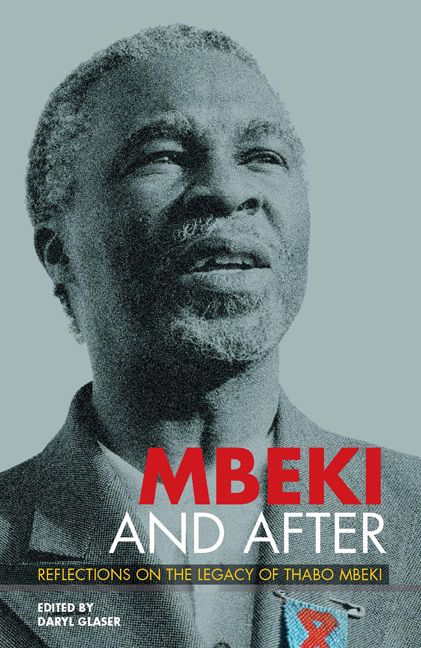Book contents
- Frontmatter
- Contents
- Acknowledgements
- Acronyms
- General Reflections
- The Mbeki Style Of Governance
- Mbeki And Society
- 5 Thabo mbeki and dissent
- 6 Civil society and uncivil government: The Treatment Action Campaign versus Thabo Mbeki, 1998-2008
- Mbeki And Race
- Mbeki Abroad
- Notes
- Contributors
- Bibliography
- Index
5 - Thabo mbeki and dissent
from Mbeki And Society
Published online by Cambridge University Press: 21 April 2018
- Frontmatter
- Contents
- Acknowledgements
- Acronyms
- General Reflections
- The Mbeki Style Of Governance
- Mbeki And Society
- 5 Thabo mbeki and dissent
- 6 Civil society and uncivil government: The Treatment Action Campaign versus Thabo Mbeki, 1998-2008
- Mbeki And Race
- Mbeki Abroad
- Notes
- Contributors
- Bibliography
- Index
Summary
INTRODUCTION
In June 2009 protest action erupted in local authorities in the North West, Mpumalanga and Eastern Cape provinces (Moselakgomo 2009; SAPA 2009a). In spite of a change of leadership of the ruling African National Congress from Thabo Mbeki to a reputedly more pro-poor Jacob Zuma, protestors raised a set of grievances that had become all too familiar during Mbeki's term of office (Bernstein & Johnston 2007; Atkinson 2007: 53-77) against unresponsive councillors, mismanagement and corruption, unemployment and lack of service delivery.
Protest action erupted in spite of the fact that the new Zuma-led government was at pains to distance itself from the authoritarian practices of Mbeki's administration. Minister for Co-operative Gove - rnance Sicelo Shiceka (SAFM 2009) stated that the reason why protest action was escalating was that, unlike in the recent past, government was now making space for grievances to be heard so that they could be addressed. In fact, in response to the protest action in eThandukukhanya in the Mkhondo municipality Mpumalanga Premier David Mabuza suspended all councillors, as well as the mayor and municipal manager (SAPA 2009c).
This chapter considers whether Shiceka's implied criticism of the Mbeki administration's intolerance of dissent was well founded and analyses whether spaces for autonomous political mobilisation and dissent widened or narrowed during Mbeki's period in office. It focuses on the many ways in which the right of communities, interest groups, social movements and political organisations to assemble, demonstrate and picket was subverted during that time. Sidney Tarrow (1998: 874) has defined dissent as ‘collective activity on the part of claimants or those who claim to represent them relying at least in part on noninstitutionalised forms of interaction with elites, opponents or the state’.
As a means of expressing dissent protest action can take many forms, legal and illegal, such as strikes (including sit-down strikes), sit-ins, public meetings, the invasion and occupation of strategic sites, boycotts, barricades, civil disobedience, and violent direct action (such as the destruction of property) (Tarrow 1998: 100-117). The ultimate objective of protest action is to use unconventional methods of influencing decision-making rather than the formal representative structures such as Parliament (Della Porta & Diani 1999: 168-169), whether in order to make claims on power or – in the case of anti-systemic actions – to change how power is exercised.
- Type
- Chapter
- Information
- Mbeki and AfterReflections On The Legacy Of Thabo Mbeki, pp. 105 - 127Publisher: Wits University PressPrint publication year: 2009



